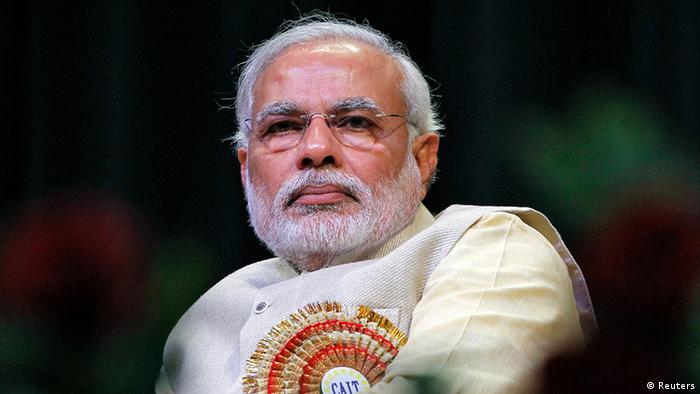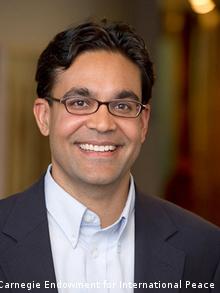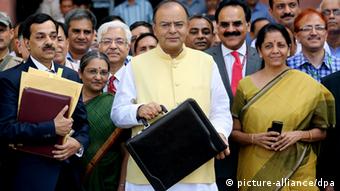Welcome
....to JusticeGhana Group

JusticeGhana is a Non-Governmental [and-not-for- profit] Organization (NGO) with a strong belief in Justice, Security and Progress....” More Details
Modi's 'pro-growth' budget 'lacking on key issues'
- Details
- Parent Category: Our Country
- Category: Business & Finance
- Created on Thursday, 10 July 2014 00:00
- Hits: 3134
Modi's 'pro-growth' budget 'lacking on key issues'
India's new government has unveiled its maiden annual budget aimed at reviving growth and boosting foreign investment. But analyst Milan Vaishnav tells DW New Delhi still lacks a detailed blueprint for economic renewal.

The budget, presented by the recently elected BJP government on Thursday, July 10, promises a return to faster economic growth, an expansion of foreign investment in key industries, and fiscal discipline. Finance Minister Arun Jaitley said to parliament that the steps announced in the budget "are only the beginning of a journey towards a sustained growth of seven to eight percent or above within the next three, four years."
The budget also included 10 billion rupees (167 million USD) for accelerating the development of the railway system in areas bordering Pakistan and China. The new government, which was elected with a strong mandate, also announced a 12-percent rise in military spending in a bid to modernize the country's armed forces.
In a DW interview, Milan Vaishnav, political analyst in the South Asia Program at the Carnegie Endowment for International Peace, says there is no doubt that the Modi government's first budget is pro-growth in its orientation, but it is short on specifics on a number of key issues.
DW: Reviving economic growth and alleviating poverty were the core elements of the BJP's electoral agenda. Is the new government's budget of structural reforms likely to boost the country's flagging economic growth rates?
 Milan Vaishnav: There is no doubt that the Modi government's first budget is pro-growth in its orientation. The Finance Minister repeatedly made reference to increasing investment, making India a more hospitable place to do business, and easing the path especially for foreign investors. Yet, what the budget lacked was an overarching vision or detailed blueprint for economic renewal.
Milan Vaishnav: There is no doubt that the Modi government's first budget is pro-growth in its orientation. The Finance Minister repeatedly made reference to increasing investment, making India a more hospitable place to do business, and easing the path especially for foreign investors. Yet, what the budget lacked was an overarching vision or detailed blueprint for economic renewal.
The budget re-affirmed the government's intention to pursue "structural reforms," but provided little in the way of specifics on a number of key issues. For example, there are no fewer than seven mentions of referring contentious issues to "committees." - bureaucratic-speak for kicking the can down the road.
There were nearly 30 mentions of individual Rs. 100 crore (16.6 million USD) initiatives or schemes which gave the speech a scattershot feel. Even on the all-important fiscal deficit, the government has stuck to the ambitious - some might say unrealistic - revenue projections made by the previous government that are needed to slash the deficit to 4.1 percent of GDP. But we do not have a clear sense of how those targets will be achieved.
PM Modi has repeatedly said he wants to boost manufacturing sector in India and allocate more funds to the development of certain manufacturing clusters. What is your take on this? Are the measures enough to boost the sector and create enough jobs?
Boosting manufacturing was a major theme of the budget speech and there were a number of pro-manufacturing initiatives mentioned by the Finance Minister. For instance, the government intends to set up a National Industrial Corridor Authority to coordinate the development of industrial corridors across the country. The Finance Minister also introduced a number of tax concessions, investment incentives and new industrial "clusters" meant to stimulate manufacturing growth.
However, the binding constraints to manufacturing in India remain unaddressed - namely regulation of the key factors of production such as land and labor. Unless and until reforms are introduced to ease labor laws or make it easier for firms to acquire land, it is unlikely that India’s manufacturing sector will take-off.
 What were the Indian industry's main expectations from the budget?
What were the Indian industry's main expectations from the budget?
Industry was looking for three things: a credible commitment that would signal the government’s intention to a) pursue growth-enhancing policies; b) deepen fiscal consolidation and reform subsidies; and c) bring clarity to India’s messy tax regime. This budget will not overly please or displease industry; it was a "safe" budget which leaves a lot of details for the future.
Finance Minister Arun Jaitley announced the government would initiate tax reforms to unify India's 29 states into a common market and introduce a national Goods and Services Tax (GST) system. However, there have been many disagreements between federal governments and the states over the issue. How will the Modi-led administration overcome the challenges?
I would say this was one of the big disappointments of the budget speech. There was very little in the way of specifics on implementing GST. Other than saying the GST was a priority and that New Delhi would seek to intensify discussions with the states, the Finance Minister neither put forward a notional timeline nor provided any hints for how the center might assuage the states' concerns on compensation - for lost tax revenue - and the inclusion of big-ticket items such as alcohol and petroleum in the tax scheme.
Granted the new government has only been in office for six weeks, but this was a big target they should have seen coming.
Is this new budget truly a foreign investor-friendly budget?
This budget, taken as a whole, is largely friendly to foreign investors - with some important caveats. On the plus side, the Finance Minister announced that foreign direct investment limits in insurance and defense would raised to 49 percent, clarified norms on transfer pricing, and introduced a number of initiatives that could make it easier for foreign portfolio investment to enter the country.
But while the new 49 percent foreign investment limit on defense may be an improvement, it still means no majority foreign stake, and this may not be enough to attract serious investment and technology transfer. Furthermore, one of the biggest irritants for foreign investors has been uncertainty on tax policy, especially on retrospective taxation.
On that front, the Finance Minister assured foreign investors this government has no plans to pursue fresh retrospective tax claims against companies, but it would allow existing cases to work their way through the justice system. This means that high-profile cases like that involving telecom giant Vodafone will persist.
Some economists say that Modi’s financial policies are only aimed at benefiting the rich. Are these claims true?
To the extent this government invests in growth, there will be real benefits for India’s poor. This was one of the lessons, oft forgotten by the United Progressive Alliance (UPA) government, of the high growth decade of the 2000s. In terms of specific schemes and programs, the government has not reversed subsidies in any significant way - which are often pitched as serving the poor, though quite often benefit the non-poor - or reversed big entitlement programs such as National Rural Employment Guarantee (NREGA). However, on the latter, it has signaled its intent to shift the focus toward productive asset creation.
Critics say that an unbridled privatization process might increase poverty in India and that the country's poor might not be able to cope with it. What is your view on this?
Privatization is a bad word in the Indian context given the ubiquity of state-owned enterprises and public sector undertakings.
 This government has not, in this budget anyway, made a major privatization push though it has given a fillip to "disinvestment" - which means the government will sell shares of government-controlled entities but will retain a majority stake.
This government has not, in this budget anyway, made a major privatization push though it has given a fillip to "disinvestment" - which means the government will sell shares of government-controlled entities but will retain a majority stake.
The experience across developing countries on privatization has been mixed, especially in cases where regulatory agencies are not well-developed. The bottom-line then is that privatization has to be well thought through and the government may need more time. But assuming it can develop a coherent, transparent plan for privatization, the poor could stand to benefit hugely.
Milan Vaishnav is an associate in the South Asia Program at the Washington-basedCarnegie Endowment for International Peace. His primary research focus is the political economy of India, and he examines issues such as corruption and governance, state capacity, distributive politics, and electoral behavior. You can follow him on Twitter @MilanV.
The interview was conducted by Gabriel Domínguez.
Date 10.07.2014
Author Interview: Gabriel Domínguez
Editor Shamil Shams
ource: Deutsche Welle




